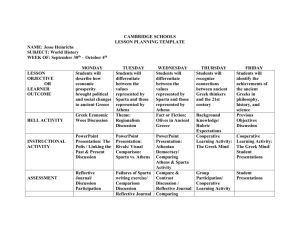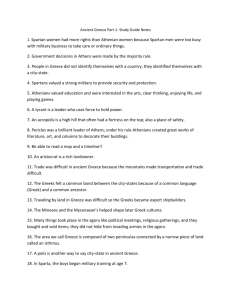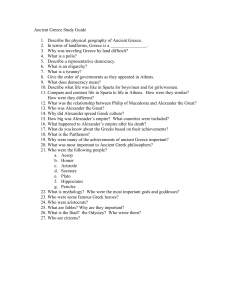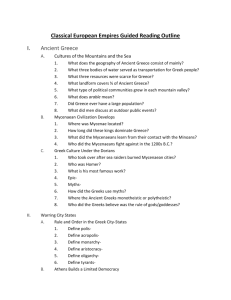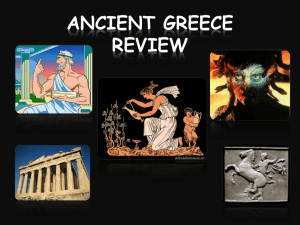Ancient Greece Notes
advertisement
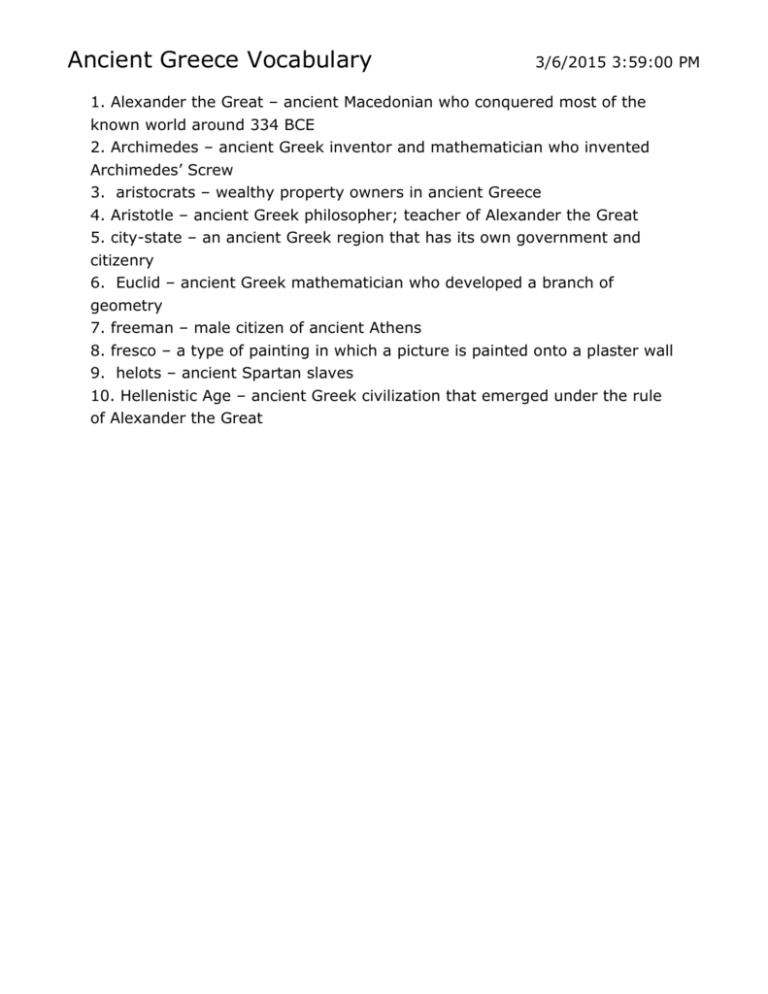
Ancient Greece Vocabulary 3/6/2015 3:59:00 PM 1. Alexander the Great – ancient Macedonian who conquered most of the known world around 334 BCE 2. Archimedes – ancient Greek inventor and mathematician who invented Archimedes’ Screw 3. aristocrats – wealthy property owners in ancient Greece 4. Aristotle – ancient Greek philosopher; teacher of Alexander the Great 5. city-state – an ancient Greek region that has its own government and citizenry 6. Euclid – ancient Greek mathematician who developed a branch of geometry 7. freeman – male citizen of ancient Athens 8. fresco – a type of painting in which a picture is painted onto a plaster wall 9. helots – ancient Spartan slaves 10. Hellenistic Age – ancient Greek civilization that emerged under the rule of Alexander the Great The Early Greeks 3/6/2015 3:59:00 PM A. Geography of Greece 1. Centered around the Aegean Sea 2. Many people settled on the peninsula called Peloponnesus 3. Rugged mountains/ bays/ inlets all divided Greece into many small, independent and isolated regions 4. Sea linked Greece to other peoples, products, and ideas B. Farming in Greece 1. Climate is similar to Southern California a. Mild winters and hot summers b. Allowed farmers to raise crops all year round 2. The hilly terrain was great for harvesting grapes and olives but not for grains such barley and wheat (grains were scarce) 3. Sail West (Sicily), East (Black Sea Region), and South Egypt for grains C. Minoan Civilization (2000 BCE to 1400 BCE) 1. Developed on Crete ( Southern Island in Greece) 2. Developed under King Minos who was conqueror and lawgiver D. Minoan Accomplishments 1. Developed a system of writing, art work, pottery, metal bowls, jewelry and weaving 2. Great sailors who carried trade with people of Egypt, Phoenicia, Mesopotamia 3. Master builders (Huge palaces with maze-like series of rooms surrounding a courtyard) a. Underground plumbing and piped water to luxuries bathrooms E. Mycenaean Civilization 1. Largest city that was built on the hilltops 2. Built large fleet of ships to capture rich trade routes and establish colonies 3. Adopted Minoan writing system and palace style 4. In 1450 BCE, Mycenaean’s conquered the Minoans. (Mycenaean Age = 1400 to 1100 BCE) F. Dark Ages (1100 to 800 BCE) 1. Mycenaean’s fell to invaders and the Dorians (people from the Northern Greece) moved in 2. Trade at standstill and written language disappeared 3. Early history NOT lost because oral tradition passed on legends and myths 4. In 800 BCE, Greeks began to write again using the alphabet systems based on Phoenicians An Ancient Greek Myth 3/6/2015 3:59:00 PM 1. Where does King Minos live? Lives on an Island called Crete. 2. What is the deal Athens made with King Minos? If King Minos did not attack Athens for 9 years he would send 7 boys and 7 girls for the minotaur to eat them 3. Who promised to kill the Minotaur? Prince Theseus 4. What help did Ariadne offer? She offered to help kill the minotaur by giving him the ball of string and a sword only if he brings her somewhere else so they can see her beauty. What character traits best describe Ariadne? Vain, courageous because willing to defy her father, conceded, observer, selfish, deceiver 5. What does the final line of the myth mean? If you make a deal with someone you have to keep it. You can do anything as long as you follow the rules of the deal. The Odyssey – by Homer Begins at the end of the Trojan War ( Iliad - War between the Greeks and Troy over the beautiful Helena) The Odyssey tells the tale of Odysseus journey home Epic or long poem Shows how the Greeks believed the gods controlled/ interfered with mortals lives Summary of Book (Chapter) Nine: Odysseus and his crew stumbled onto an island discovering goats and milk. They end up meeting a giant Cyclops the son of Poseidon. Polyphemus eats four of the men. Odysseus and his crew makes a giant spear and poke Polyphemus’s eye out blinding him. They sneak out under the goats and travel away on their boats taunting the Cyclops. Polyphemus begs his father for vengeance. Athens: A City-State 3/6/2015 3:59:00 PM 1. What is a Freeman? 2. Draw the Social Hierarchy for Athens in the pyramid below. 3. What is the difference between life in Athens for boys and girls? A. City- state: 1. Isolated cities of the dark ages developed into city-states 2. Independent, self-governing 3. Monarchy- a system of government in which a king rules over a group of people B. Oligarchy: 1. A system of government in which a few people hold power over a large group 2. King relied on wealthy landowners (nobles) to help defend their land a. Nobles demanded power and eventually share equal power with the king C. Tyrant: 1. A Greek leader who seized power by force and rules a city-state alone 2. Important step towards democracy because taught citizens that uniting behind a leader, they can gain power to make changes D. Democracy of Athens: 1. 510 BCE, Athens with help from Sparta drove the harsh tyrant Hippias out of Athens 2. Citizens of Athens chose to share the decision making power among themselves a. Council of 500: citizens who chosen randomly every new year who propose new laws b. The Assembly: all citizens, vote on new laws c. Jurors (Judges) who interpreted laws to decide guilt or innocence 3. Citizenship in Athens a. men over 18 years of age and only if his father was a citizen b. women has no political rights and could` not own land Ancient Greek Culture 3/6/2015 3:59:00 PM Homework: 1. Describe life in Sparta for boys? Girls? 2. What were Spartan slaves called? 3. Compare life in Sparta to life in Athens. 1. The family of Greek Gods a. Olympic games honored Zeus and names after city of Olympia b. Zeus father of gods master of universe c. Gods controlled bother the world of nature and human world d. Greeks built sanctuaries to honor gods with sacrifices i. Olympia – Zeus (Olympics) ii. Delphi – Oracle to Apollo iii. Delos – Oracle to Apollo Competition ever 5 years iv. Eleusis – Demeter (Goddess of grain) 2. Greek Drama a. Twice a year, writers composed plays about politics, gods, and heroes and presented them at the festival in Athens to honor Dionysus b. Tragedy – sad story which hero is brought to ruin by character flaw c. Comedy- funny plays A tale of 2 City-States 3/6/2015 3:59:00 PM HW: 1. What is the Delian League? 2. What is the Peloponnesus League? 3. Who won the Peloponnesian War? (Think about it!!) 4. Who is the father of Modern History? Why is he called this? 1. Government of Sparta a. Began as Monarchy but became/remained as an oligarchy b. Sparta had 2 kings c. 30 man senate (citizens and > 60 years old) d. Assembly could vote for or against laws i. Elected 5 Ephors who proposed laws to the assembly 2. Economy of Sparta a. Sparta men could only be a soldier b. Spartan means simple life with out luxuries c. Each Spartan received a plot of land d. Helots- state slaves assigned to a plot of farmed land i. Some of the crops were given to the helots as wages, some were given back to the government for meals ( if government not paid, would lose citizenship) Golden Age of Athens 3/6/2015 3:59:00 PM 1. The Age of Pericles (460 – 429 BCE) a. In 460 BCE, elected as one of the 10 generals (Term lased 1 year but Pericles was reelected over and over again) b. 3 Main Goals for Athens i. Protect from Enemies 1. Built wall around city and path to port 2. Built Strong Navy ii. Most Beautiful city 1. Acropolis – flat, topped fortified hill in middle of Athens 2. Parthenon – dedicated to Athena 2. Life in a Citizen Family a. Agora – a large, open square market place in center of city state 3. Life for Non Citizens a. Wealthy citizens had pleasant lifestyle because non citizens did work i. Metics registered with government and paid monthly tax to work in Athens 1. Attend festivals, theater, and right to use courts of law ii. Slaves had no legal rights 1. Often worked alongside Athenians except silver mine slaves owned by state Ancient Greece Mini- TEST Review 3/6/2015 3:59:00 PM Economy of Sparta Spartan men were only allowed to be soldiers Persian War Battle of Marathon- Athens Won (26.1 Miles from Athens to Sparta) Battle of Thermopylae – Persia Won ( Spartans held off Persians long enough to allow the rest of Greece to retreat to safety) Battle of Salamis (Greece won!) Government Monarchy – Rule of One Democracy – Rule of People (Athens: 1. Assembly- Propose laws 2. Council 500 – vote on laws 3. Citizenship- > men 18 years of age and father had to be a citizen ) Tyrant – Rule by Force (How did tyranny lead to the development of democracy?) Oligarchy- Rule by Few (Sparta : 1. 2 kings 2. 5 Ephors 3. Assembly 4. 30 man senate) Minoans Achievements : Running Water, Elaborate Mazes, Indoor Plumbing and Mycenaean Vocabulary: Helots, Freeman, City-State (Polis), Aristocracy, Fresca, Thetes Greece Map Short Answer: What does the term Sparta mean/represent? How did the physical geography of Greece contribute to the development of city-states? Rugged Mountains, inlets, and bays divided Greece into small, independent regions which led to the development of City-states with their own governments, and culture.



